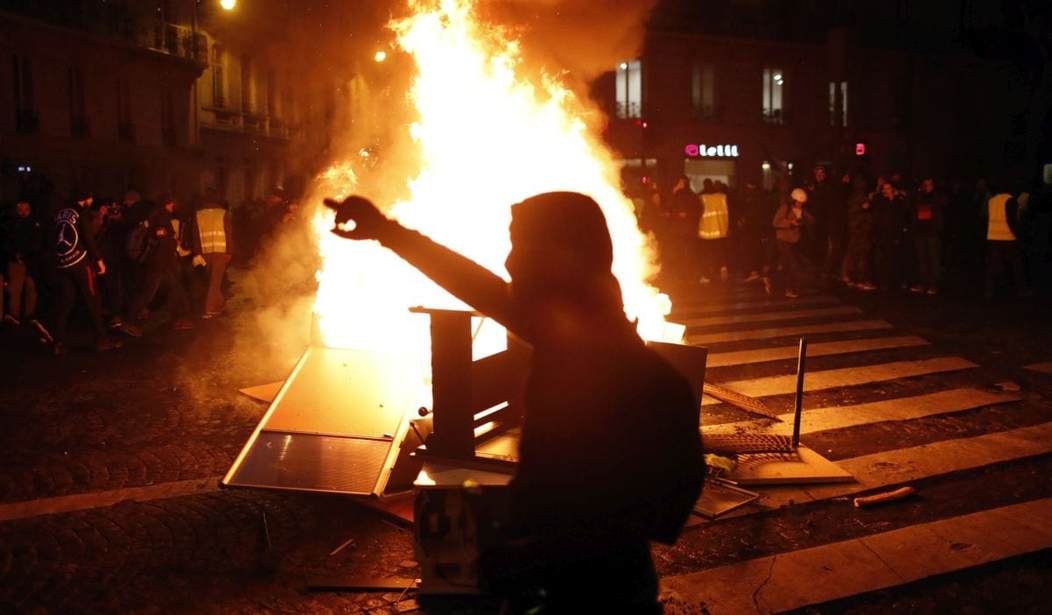At least 700 people were arrested in Paris as 5,000 demonstrators faced off against 8,000 police in another violent demonstration by “yellow vest” protesters.
Riots broke out all over France despite the supposed cause of the violence being eliminated earlier in the week by the government of President Emmanuel Macron. The government had been claiming that a fuel tax increase was to blame for the protests, but the government rescinded the increase on Wednesday.
Donald Trump believes it was Macron’s climate change policies:
The Paris Agreement isn’t working out so well for Paris. Protests and riots all over France. People do not want to pay large sums of money, much to third world countries (that are questionably run), in order to maybe protect the environment. Chanting “We Want Trump!” Love France.
— Donald J. Trump (@realDonaldTrump) December 8, 2018
But the protesters themselves were giving the real reason for the violence — if anyone in Macron’s government was listening.
“We are not here to destroy Paris, we are here to tell Macron we are f–king fed up,” said one protester before the clashes with the police began, adding that the people are protesting ever-increasing taxes on the working class.
[…]
Many protesters slammed the French media for portraying the protests as led by violent agitators and for siding with Macron’s government.
“We are not black bloc [black clad anarchists], we are ordinary people voicing our anger,” said a protester who did not want to be identified.
Meanwhile, the contagion has spread to neighboring Belgium and the Netherlands.
Belgian police fired tear gas and water cannons at yellow-vested protesters calling for the resignation of Prime Minister Charles Michel after they tried to breach a riot barricade, as the movement that started in France made its mark Saturday in Belgium and the Netherlands.
Protesters in Brussels threw paving stones, road signs, fireworks, flares and other objects at police blocking their entry to an area where Michel’s offices, other government buildings and the parliament are located.
Brussels police spokeswoman Ilse Van de Keere said that around 400 protesters were gathered in the area.
About 100 were detained, many for carrying dangerous objects like fireworks or clothing that could be used as protection in clashes with police.
The reasons for the protests are not entirely clear. Neither Belgium nor the Netherlands has proposed a hike in fuel tax — the catalyst for the massive and destructive demonstrations in France in recent weeks.
Instead, protesters appeared to hail at least in part from a populist movement that is angry at government policy in general and what it sees as the widening gulf between mainstream politicians and the voters who put them in power. Some in Belgium appeared intent only on confronting police.
The fuel tax hike was a “catalyst” for French protests only in the mind of the media, something they should now sheepishly admit given the spread of the protests to neighboring countries.
In the Dutch city of Rotterdam, a few hundred protesters in the high-visibility vests that have become a symbol of the movement walked peacefully across the downtown Erasmus Bridge singing a song about the Netherlands and handing flowers to passers-by.
Sisters Beb and Ieneke Lambermont, aged 76 and 67 respectively, were among them.
“Our children are hard-working people but they have to pay taxes everywhere. You can’t get housing anymore. It is not going well in Dutch society,” Ieneke said. “The social welfare net we grew up with is gone,” she said.
“The government is not there for the people. It is there to protect its own interests,” she said.
Are you listening, EU leaders?
The nationalist movements in Europe are not the stirrings of proto-fascists, or due to hatred for refugees. Certainly there is some of that sentiment present and it is worrisome. But the ordinary people who are paying for the grandiose schemes of the social planners in Brussels have had enough. And they are finally rising up to demand an end to it.
This is a continent-wide class protest, something Europe has been experiencing for more than 100 years. In that, there is nothing new.
What is new is that the grand social democratic experiment that began after the end of World War II may finally be coming to an end. Governments can only spend other people’s money for so long before there is a backlash. I would say that the backlash is well underway.










Join the conversation as a VIP Member